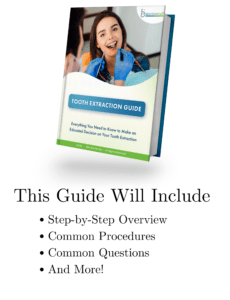
If you have crowded and infected teeth or an impacted wisdom tooth, you may need a tooth extraction. Tooth extractions are standard general dental services and remove teeth that are overcrowded, infected, impacted, or decaying. A tooth extraction in our Hoffman Estates, IL office will help remove dental problems and improve the oral health of patients who undergo the procedure.
Reasons for Tooth Extraction in Hoffman Estates, IL
Dentists extract teeth in cases where the teeth or gums have negatively impacted a patient’s oral health. Some common reasons for extraction include:
Periodontal Disease
Also known as gum disease, periodontal disease quickly impacts the health of gums and teeth. Patients with excessive damage due to gum disease may need a tooth extraction. Gum recession and severely inflamed gums can loosen the teeth. If we cannot save teeth with periodontal therapy, they will need to be removed.
Extensive Tooth Decay
A simple tooth extraction may be the only option in advanced cases of tooth decay. Sometimes, we cannot save a tooth using conservative measures. Before recommending an extraction, we may recommend a dental filling or root canal to preserve your tooth. In severe cases, you may need a dental extraction to prevent decay from spreading and causing more damage.
Impacted Wisdom Tooth
Impacted wisdom teeth need extraction in most cases. They cause tooth or gum infection, tooth pain, or severe damage to neighboring teeth. Patients in their late teens or early 20s are likely candidates for wisdom teeth removal. Dr. Patel will monitor the development of wisdom teeth in our young patients. He can offer wisdom tooth extraction for all ages in most situations.
Overcrowding
Overcrowded teeth can lead to many problems, including:
- Complex bite disorders
- Crooked teeth
- Excessive enamel wear
- Jaw pain
Overcrowding can also increase the risk of tooth decay. This is because it can be difficult to clean between crooked teeth. Removing overcrowded teeth can help alleviate painful symptoms and prevent gum disease.
The Tooth Extraction Procedure in Hoffman Estates, IL
To begin dental extraction, we numb the treatment area with a local anesthetic. This local anesthetic will minimize tooth sensitivity and pain.
There are two types of dental extractions: simple and complex extractions. During a simple extraction, we remove a tooth above the gum line. A complex extraction often requires more time, as we remove teeth at or below the gum line during this extraction. Complex extractions often require dental sedation in addition to local anesthetic. We may refer you to an oral surgeon for a complex tooth extraction.
After we extract the tooth or teeth, we rinse and clean the tooth socket. Then, we pack the socket with gauze. The gauze will help protect the extraction site as it heals.
Replacing Extracted Teeth
If you receive an extraction for a severely damaged or infected tooth, you will need a replacement. Dr. Dhara Patel may recommend dental implants, dental bridges, or dentures and partials to replace a missing tooth or teeth.
A dental implant can replace a single tooth or secure bridges and dentures. If you need to restore a single tooth, we recommend a dental implant that connects a dental crown. A dental bridge can restore multiple consecutive missing teeth. If you have teeth missing in different areas of your smile or full arches of teeth missing, we recommend dentures. Restorative options can help prevent further gum and tooth problems by replacing missing teeth.
Post Tooth Extraction Tips
After your extraction, you want your tooth sockets correctly. You can follow these tips to ensure that your extraction sites heal properly:
- Keep gauze over your extraction sites and replace the gauze as needed until the bleeding stops.
- Eat soft foods for the first 48 hours after your extraction.
- Take pain medication as prescribed.
- Apply ice to your cheek and jaw to minimize swelling.
- If blood clots do not form at the extraction sites or are dislodged, contact us. We will prescribe you medication to treat dry socket.
- Do not brush your teeth or rinse your mouth until 24 hours after tooth extraction.
- We will provide a syringe to clean your extraction sites once they stop bleeding. Fill the syringe with water to gently rinse your tooth sockets.
Please contact our office if you have any questions during the healing process. We want to ensure that healing goes as smoothly and comfortably as possible.
Tooth Extraction FAQs
Do you have additional questions about extractions? Discover more about dental extractions with answers to these common questions:
Can I eat normally after tooth extraction?
After a tooth extraction, dentists typically tell their patients to stick to a soft diet for at least 24 hours. However, many patients continue the soft diet for a few days. Some foods that are common and easy to eat are yogurt, Jell-O, pasta, milkshakes, pudding, and smoothies.
Can I brush with toothpaste after an extraction?
After we perform a tooth extraction, avoid brushing the area that the tooth was extracted from for 3-4 days. It lets the gums clot and prevent dry socket. Avoid brushing with toothpaste. It is best to rinse with water and wipe the area with gauze.
How long does it take for a tooth extraction to heal?
Your gums need time to heal and form clots to protect the area. After three days post-extraction, patients’ gums should begin to heal. At this time, patients can begin to introduce foods other than their soft diet. It takes about a week to 10 days for gums to heal and swelling to decrease.
Does Dr. Patel extract wisdom teeth?
Dr. Patel will extract wisdom teeth in most cases. In the event of a complex case where there is significant impaction, she may refer you to a local oral surgeon for care.
Request a Dental Exam Today
If you need one or more teeth extracted, call Best Dental Spa at 847.660.6603. You can also schedule an appointment with us online at your convenience, and we will get back to you in a timely manner.
IF YOU HAVE MORE QUESTIONS CONTACT US
(224)293-6282
